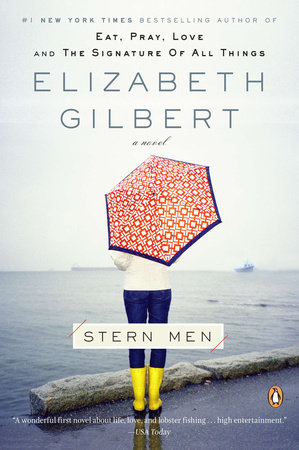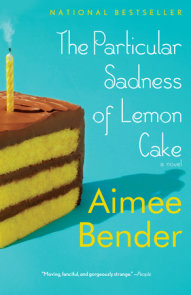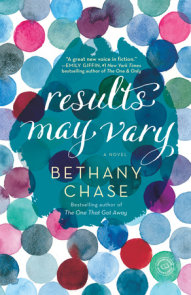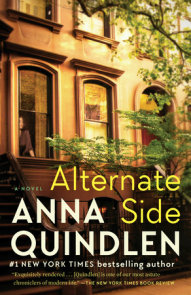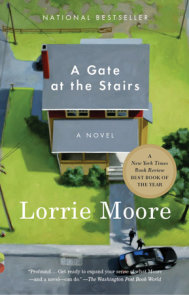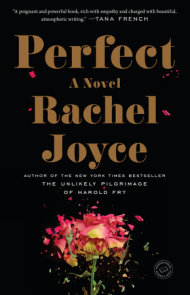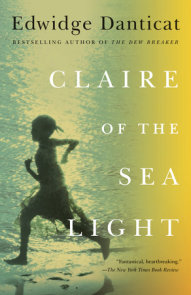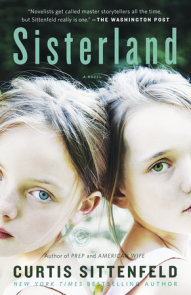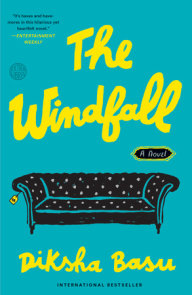READERS GUIDE
Questions and Topics for Discussion
INTRODUCTION
“Honestly, was there any reason a smart fisherman had to wake up at four A.M.? There had to be a better way.” —Stern Men
Off the coast of Maine lie the remote islands of Fort Niles and Courne Haven. The two are virtually identical, have no near neighbors, and are separated only by a shallow channel less than a mile wide. Yet, for generations, their residents have been divided by a bitter and occasionally bloody feud begun by a long-forgotten man of questionable sanity. So by 1976, the only thing that the hard-drinking, stubborn, and proud lobster fishermen of Fort Niles know for certain is that they hate the hard-drinking, stubborn, and proud lobster fishermen of Courne Haven . . . and vice versa. What neither group realizes, however, is that outside forces are conspiring to change their way of life forever, and their hope for salvation just might lie in the hands of a very unusual young woman.
Ruth Thomas was born on Fort Niles in 1958 during “a week of legendary, terrible storms” (p. 12) and their fury established the tenor of her early years. Her parents—Stan, a native Fort Niles lobsterman, and Mary, the illegitimate, quasi-granddaughter of the island’s wealthy mainland patrons—separated when their daughter was just nine, and Ruth has been struggling against her mother’s attempts to win her away from Fort Niles ever since.
Up until she turned eighteen, Ruth was coerced into attending an elite boarding school in Delaware with girls “who fussed over their figures annoyingly, uninterruptedly, odiously” (p. 46). And, upon graduation, she proclaims her decision to eschew college in favor of joining her father, Stan, on his lobster boat as a stern man. No one is pleased by this announcement—not even Ruth who, honestly, finds both lobster fishing and her father’s company profoundly boring. Fortunately, her father has already engaged a stern man for the season, and Ruth is left to fume insincerely over her disappointment.
Though quick with a lie when it suits her, Ruth is honest with herself and knows two things for certain: she loathes the Ellises and she very much likes the solid, silent figure and blond eyelashes of one Owney Wishnell—a descendent of Courne Haven’s finest lobster-fishing family and therefore one of her father’s most hated rivals. Equipped with this knowledge, Ruth sets out in search of her destiny.
To the naked eye and especially to Cal Cooley—the Ellis family’s eyes and ears and Ruth’s nemesis—it might seem as if she were simply idling the summer away. Even Ruth herself is unsure what course her meanderings will take, but there is one person on the island who is confident they are the prelude to greatness. And, in the end, an elephant’s tusk, an antique lighthouse lens, and a drunken foray on Courne Haven point the way toward happiness and the salvation of the world Ruth loves.
In her sparklingly original debut novel, Elizabeth Gilbert’s indomitable heroine takes on a world hitherto run by men and achieves a triumph that trumps even her most ardent naysayers. Told with wit and compassion, and peopled by an endearingly quirky cast of characters, Stern Men also offers a tantalizing early glimpse of the writer whose own story would go on to strike a chord with millions of readers.
ABOUT ELIZABETH GILBERT
Elizabeth Gilbert is a journalist and the author of the blockbuster New York Times bestseller, Eat, Pray, Love. She is also the author of Pilgrims, a Pushcart Prize–winning short-story collection, and The Last American Man, a nonfiction finalist for both the National Book Award and the National Book Critics Circle Award. Stern Men was originally published in 2000. It is her first and only novel.
A CONVERSATION WITH ELIZABETH GILBERT
Q. You write about the Fort Niles/Courne Haven communities with such affection and in such intimate, quirky detail. Did you grow up in a similar milieu?
Not really. . . . I had a very inland upbringing, raised in the Berkshires on a small family Christmas tree farm. But my parents were somewhat quirky (my father, particularly) and I always felt that our family (my father’s family, specifically) were a cast of fairly unusual souls, who lived in a world that didn’t really look like anyone else’s world—and who were also big drinkers and creative cursers, just like many of the characters in the novel. I think I got an early taste for insular eccentrics, which has never really abated.
Q. Where did you find all the colorful historic tidbits of lobster facts and lore that preface each chapter?
I spent months poring through all the arcane old literature about lobsters that could be found in the New York Public Library. I wrote this book before I had access to such a thing as the Internet, so the NYPL was still the Google of the day for me. One thing I loved about living in New York was that it was almost easier for me to find lobster-related information in that grand old urban library that it was to find such details in the historical societies of rural Maine. Although the historical societies of rural Maine helped, too, most of those marvelous lobster-related gems were excavated from the bowels of midtown Manhattan.
Q. Ruth is such an original heroine but there are also traces of Elizabeth Bennett and Jo March in her. Who or what inspired her creation?
To be honest, I wrote her as a response to reading The Portrait of a Lady by Henry James. It’s one of my favorite books, but I don’t think it’s an overstatement to say that I was haunted by the fate of its heroine, Isabel Archer. I don’t think I’d ever met a woman in literature whom I related to more (with her craving for adventure, her frank Americanness, her sensual curiosities, and her willingness to throw away caution in the endless search for “experience.”) But James wrote in the nineteenth century, and so Isabel was punished harshly for her spirited nature—and by the end of the book she is fairly well ruined, destroyed by the manipulations of others. Ruth shares many of those same qualities (even down to the hidden hand of manipulation behind her life), but she rises triumphant. I couldn’t help it. I loved her (and Isabel!) too much to continue the chain of suffering.
Q. What do you imagine Ruth is doing in 2009?
Steadfastly, relentlessly, sturdily kicking butt. She may have a grandchild or two, and probably has taken up gardening—and I’m certain that she’s bringing environmental activism to the islands, and generally making a marvelous nuisance out of herself. I imagine she’s put on a hefty bit of weight and let her hair go gray and couldn’t care less. Her husband still thinks she hung the moon.
Q. Stern Men is filled with a motley crew of vivid characters. Besides Ruth, who is your favorite and why?
Oh, I love the Pommeroy sisters. Especially Kitty. There will always be a soft spot in my heart for brave, ridiculous, bawdy Kitty.
Q. Did you always plan to be a writer? Is there anything else you can imagine yourself doing? Lobster fishing, perhaps?
There is actually a word in the English language for somebody who has only one talent, and that word is “monodynamic.” I am lucky enough to be monodynamic to the extreme; writing is not just the only thing I want to do, it is the only thing I can do. I have friends who are multitalented and I’ve come to see it as a bit of a curse because their attention always wavers and they are torn between too many interests, too many gifts. For me, there are no such problems. That said, I think I would be pretty good at any job that would make an official hostess. I’m good at welcoming people. I would be a disaster as a lobster fisherman, largely because I am always cold, cannot navigate, and don’t like to have wet feet.
Q. Stern Men, your first novel, and Pilgrims, your debut book and a collection of short fiction, were both extremely well received yet your next two works, including Eat, Pray, Love, are nonfiction. What inspired the change? Will you ever return to fiction?
I keep meaning to return to fiction. It is my first love, and it was my entry into the world of writing. When I was younger I never imagined that I would write anything except fiction. I still have ideas for novels and short stories that drift by sometimes, but so far nothing has electrified me enough to motivate me to dive in and make it happen. You have to write the books you are driven to write, and for the last several years I only find myself excited by stories based in the real. Maybe this will change over time?
Q. How do writing fiction and nonfiction compare to one another? Which would you recommend to a writer just starting out?
I can’t say I recommend one over the other. Fiction is harder for me than nonfiction (where you only have to report a world, not create one) but I’ve heard other writers say different. (Some people have more luck inventing than exploring the uncomfortable real world.) In the end, it doesn’t matter. There are extraordinary works of art created in both forms—and that doesn’t even take into consideration the other great fields of writing, such as poetry, playwriting, journalism, criticism, screenwriting, etc. You must write the work that is shouting loudest in your ear to be born—the work that will not leave you alone until you make it manifest. My friend the novelist Ann Patchett says that she writes the books that she feels she is missing, that she wishes somebody else would write. If there is a hole in the world and that absence is haunting you or inspiring you—then you really have no choice but to fill it with your work and your words.
Q. How does your typical day of writing unfold?
I often go for months on end without writing—either when I am between projects, or when I am researching for a new project. I have to do a lot of research to create books. (I can’t just sit in a room and invent a novel, the way that my sister—who is a young adult novelist—can.) I need to go out there in the world and roll around in the earthy details of a story, and of course I have to spend a lot of time in the library. Only when I feel I know everything possible about a subject do I have the momentum to begin. Once I do get writing, though, my schedule is simple. I clear off a few months of space (this takes planning and the willingness to disappoint people) and then I go away (either literally, or I hide in my attic) and I write from about five in the morning until about noon. My brain, during these times, becomes like a dried out calzone: I am useless for anything else. When I am writing, I am boring to be around, and I spend most of my time staring into space. I also get a little careless with the personal grooming. But inside—where nobody can see it—the greatest happiness is steadily pulsing away. I never feel more like myself than when I am writing—even when it is difficult and even when it isn’t working. I am always my truest self during those hours.
Q. What are you working on now?
I’m finishing up a nonfiction book called Matrimonium. The subtitle is: A Meditation on the Subject of Marriage, which pretty well describes the project! This has taken up the last few years of my life, and it’s been a fascinating exploration—one that I very much needed to undertake as I approached marriage for the second time. Once I am finished with it, I plan to take the summer off and work in the garden and learn how to kayak. Then I will go hide in my attic again . . .
DISCUSSION QUESTIONS







